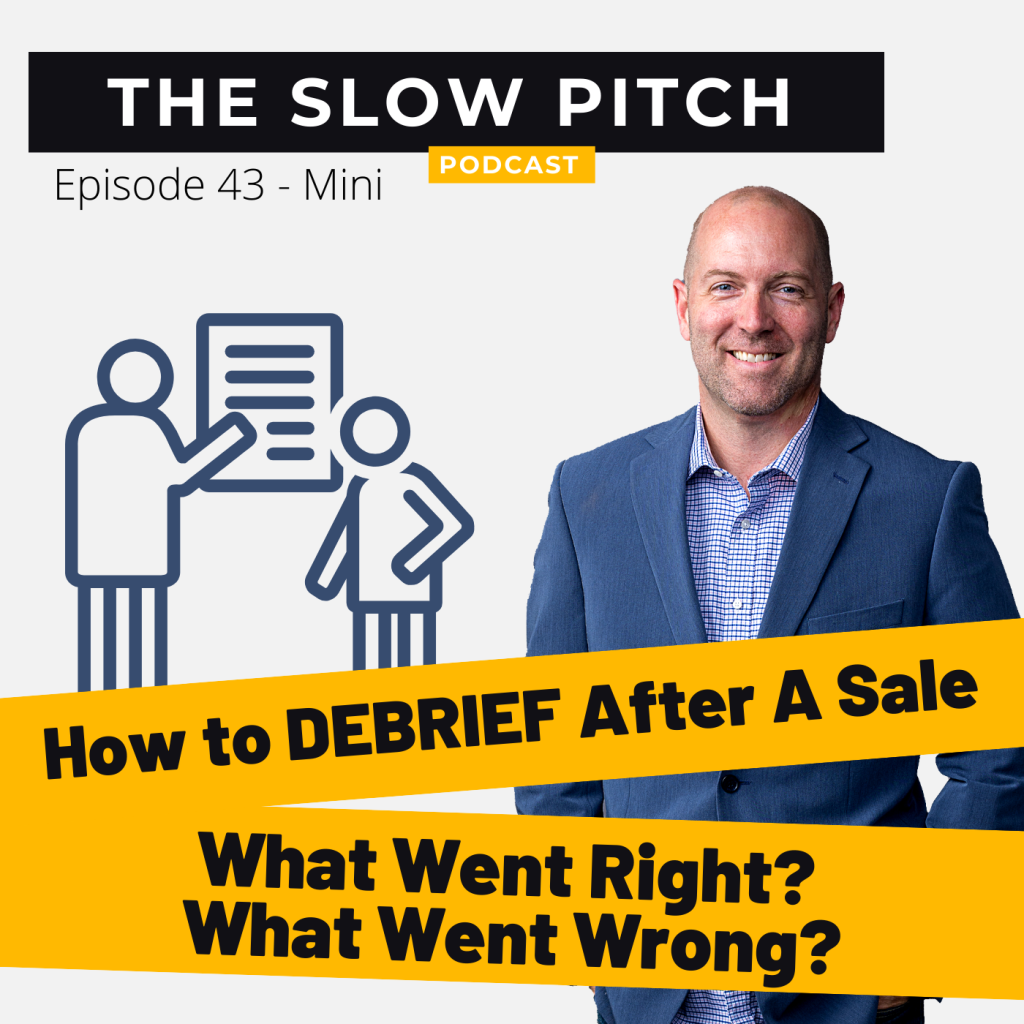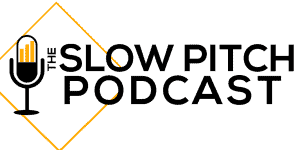How To Debrief After A Sale (3 Simple Steps)


Notes
How To Debrief After a Sale
Have you ever finished a sales meeting and wondered, “What went wrong?” Or “What went right?” That’s a debrief. There are a few ways to debrief, but in this episode we talk about how to debrief after a sale and/or sales meeting. When you think about a debrief after a sale, you’ll want to consider several components that will help you improve in the future. Pilots do a pre-flight checklist and a post-flight checklist to keep their concentration and prevent accidents. It’s one of the most effective ways of improving any process. See Debrief to Win by Robert Teschner for more on this.
Sales meetings can be long and short, but there is always something to improve and something to repeat. Think of a debrief as a SWOT analysis of every sales meeting.
We talk about how to identify and record what went well and what went poorly on the fly. We hit on what to do with that information. We also share some tips about how this information can and will help you in future meetings, either positively or negatively.
Remember, sales is a process of learning, experimenting, learning some more, and tweaking until you get it right. Once you discover your magic and your ability to get a sale (after hundreds of meetings and conversations) you’ll be able to identify what some of the strengths and weaknesses of your meetings are and learn how to correct them as you go.
Learning how to debrief will accelerate your sales. It’s time start…even if by yourself.
Related Episodes:
Top 10 Sales Tips For Beginners
How To Set Sales Goals For Sales People
Sales Call Tips – Dealing with Hostile People
Start Journaling To Jumpstart Your Selling (3 Simple Things to Do)
NOTE: Some links may be affiliate links, which means we get paid a commission when you purchase, but it the cost remains the same for you.
Music: "Clydesdale Funk" by Cast of Characters, written by: Dustin Ransom.
The Episode
Rob 00:09
Hey, welcome back everybody to The Slow Pitch. Today we’re going to talk a little bit about what you should be doing after a sales meeting, whether you win sale or you don’t win the sale, what should you be doing to make sure that you get everything you can out of the meeting you just had, and make sure you’re even more prepared for the next meeting.
V/O 00:27
You’re listening to The Slow Pitch Podcast, a podcast about selling less and closing more.
Rob 00:34
Alright, so first, let’s start out with why is this even important? Why should you even debrief after a sale? To me debriefing after a sale is kind of like taking a moment and reflecting on what went really well? And what just went off the rails? What did you wish never happened? I feel like that’s important. Because when you get going in a sales meeting, there are times where things happen that you go “Man, I wish I would not have said that,” or”I should have phrased it this way.” And if you don’t stop, after the sales meeting, and reflect and take a few notes, it’s going to be difficult for you to fix that the next time, you might just slip into that again. So one of the things that I’ve learned is, is if you take a moment and reflect about how that meeting went, it’ll help you out in the future. So let’s kind of go through a couple different things. That’s kind of why it’s important. What are some of the things you should be going through? So let’s let’s think of it this way. If you’re in a sales meeting, and you’ve done really well, there are some things that probably went well that you go, Oh, man, I wish I do that every time. So there was one time where I was in a meeting, and I just asked a particular question. And by asking that question, I learned some very valuable information about that particular individual, and how that company is going to make some decisions. And from that point forward, after I reflected, I said, I need to ask that question…again, every time I need to somehow word that question into a conversation or get that question answered, before I leave. One of the things you’re going to want to do is pay attention to what you’re doing very well during a meeting. And sometimes what I do is, while I’m taking notes from the client, if I ask a really good question, I’m getting really good answers, what I’ll do is I will, in the margin of my paper where they can’t really see it write something really small, a word or a couple of words that just remind me of what that question was, or what I did. So when I reflect later, I’ll know what I said. And I’ll remember it. So what I want you to do is think about what are some of the situations or things that you did during your sale that you did really well. And so after you’re done with that sales meeting, what you’re gonna want to do is write those situations what write those things down. On the flip side, what you’re also going to want to do is pay attention to things you didn’t do correctly. And without getting flustered in a meeting, because you can get flustered in a meeting. What you should really be doing is saying, Okay, listen, I messed that up, if you recognize it in a meeting, there’s nothing wrong with stopping the meeting and saying, I apologize. I think I just asked that question. I’m so embarrassed, I just asked that question the wrong way. And people are gonna be very open to you saying, Okay, well ask the question you really wanted to ask or correcting yourself, they’re okay with that. If you go through and you missed the question, that’s a different situation. So again, when you when you get going after the after your meeting, and you’re reflecting on it, you really should be thinking about what should I have asked, What did I miss? What are the things that I did not go through to make sure that I had all the answers that I need before I can write this estimate, or before I can take the next step, whatever that might be? Those are the kinds of things that will make a huge impact on your future meetings. So kind of think about them in terms of huge wins big things that really did really well for you write those down. I want you to also think about what are some things that, boy, when you went through that meeting, you didn’t see coming here was a problem, and you didn’t realize that was going to be a problem in getting your sale. So sometimes you get into a meeting and all of a sudden you’re like asking some questions, you realize you’re going down this road, and it’s going badly for you. That would be a situation where you would want to write that down and say this is one of those things that I was blindsided by. So maybe it’s a blind side category that you write down. I didn’t realize that was something I should not be asking about. Because I’ll get into a situation where I’m getting into territory, it doesn’t matter and it shouldn’t be a part of my conversation. The other thing I want you to look for are just opportunities. What did you miss? What could you have asked, what should you have asked that you did not ask. Now that you’ve been through that meeting, you can write all that stuff down and start to come up with a plan. That’s the basics of doing a debrief after a sales meeting.
Rob 04:39
The next step of that is to write down your plan, what is it that you’re going to do differently? And when will you work that in? So mentally, you’re going to have to envision yourself in that meeting again, are they okay? When I was in that situation? And they said ‘X’, I should have asked ‘Y.’ Right? And so by right thinking about that first and then writing that down as a plan for the future. Sure, this sounds really stupid, like, you’re not gonna bring all these plans and all these things into your next meeting are you? No, but by sitting down reflecting it, writing it out, and this takes all of 5- to 10 minutes, it does not take long, you can create your own little form. And all you have to do is jot it down, create a little plan, and so that when it comes up, you know, what you should be doing.
Rob 05:19
And then the next step on top of all of this, is, if you’ve got some really good information in there, now you have to think about how do I ask questions, before I run into these situations, so that I can get the answers that I need before these problems ever come up? Or how do I word something? Or how do I say something so that I don’t miss the question that’s really critical. A good example is I forgot to ask one time, when are they looking to take the next step? Or when are they looking to complete this entire project? It’s a timing issue, right? Sometimes what I’ll do now is in the very beginning of the meeting, because I know this is a question that I need to ask, but I’m going to forget about it. At some point, in the very beginning of the meeting, I might just say to the potential client, I have forgotten to ask this question so many times. So help me remember this, which I need to ask you when you want to finish this project up in its completion. If we get to that point, it may not make sense to answer that question now. So I’m not really concerned about the answer. I just want to remember to ask it, if we get down that road where it makes sense. By doing that you’re having the client help you remember, and the clients already thinking about that question. And you can use that on topics or questions that you will feel a little bit uncomfortable with too, because then they’re going to ask you, Hey, you forgot to ask this question. And all of a sudden, you go oh, yeah, that’s right. Let’s, let’s talk about that. You don’t even have to ask it again. You just get it out of the way. So there’s some tricks with that too. But more importantly, it’s about making sure you don’t forget that question or that that part of the questions that you need to ask, I feel like when you get done with several several meetings, you’re going to have a good feeling for where you run into trouble. And where you can excel or make things even better. In your next sales meeting, you’ll have a good list of items that you can use in the future. And sometimes by writing out this plan, all you have to do is you’re writing it out, and you end up with a couple statements, couple questions, couple things that you’ll just remember the next time that will make it even better for you. So I hope that helps. If there are questions that you have, or topics that you say, I wish you guys could talk about this, we’d love to have that. But hopefully that helps you until the next time to slow down and close more.
V/O 07:26
Thank you for listening to The Slow Pitch. Do you have a question about sales? Call or text your question at (608) 708-SLOW. That’s (608) 708-7569. Or you can email them to Questions@TheSlowPitch.com Slow Down and Close More.
Rob 08:16
Thanks as always for listening today. If you liked this podcast, please subscribe and leave us a review. We really appreciate it. Follow us on Twitter, Instagram and Facebook at The Slow Pitch. We were mixed today as always by Johnny Polakis. And we were produced by High Gravity Studios. Music credits and other notes are in the show notes section on TheSlowPitch.com And we’ll be back with another episode soon.








